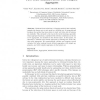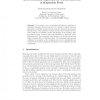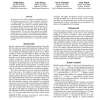1060 search results - page 43 / 212 » On the Discovery of Random Trees |
ILP
2004
Springer
15 years 5 months ago
2004
Springer
Random forest induction is a bagging method that randomly samples the feature set at each node in a decision tree. In propositional learning, the method has been shown to work well...
117
click to vote
TELSYS
2002
14 years 11 months ago
2002
Native multicast routing protocols have been built and deployed using two basic types of trees: singlesource, shortest-path trees and shared, core-based trees. Core-based multicas...
WADS
1989
Springer
15 years 3 months ago
1989
Springer
rees can be used for representing abstract data types such as dictionaries and ordered lists. They work well when the elements are inserted in a random order. Some sequences of ope...
ICAISC
2010
Springer
15 years 4 months ago
2010
Springer
In the paper a new evolutionary algorithm for induction of univariate regression trees is proposed. In contrast to typical top-down approaches it globally searches for the best tre...
AAAI
2006
15 years 1 months ago
2006
We propose two new online methods for estimating the size of a backtracking search tree. The first method is based on a weighted sample of the branches visited by chronological ba...



